Having a rescue dog in your home means having a loyal friend for a lifetime!
When Graham and Skip Fellers, from Asheville, North Carolina, decided to open their home to Dime, little did they know that the dog would become their whole life!
With his rough past behind, Dime opened his heart and soul to his pawrents, ready to embark on a beautiful life journey together. However, somewhere along the path, the couple discovered a heartbreaking secret about their loving dog…
Dime – A Gentle Giant
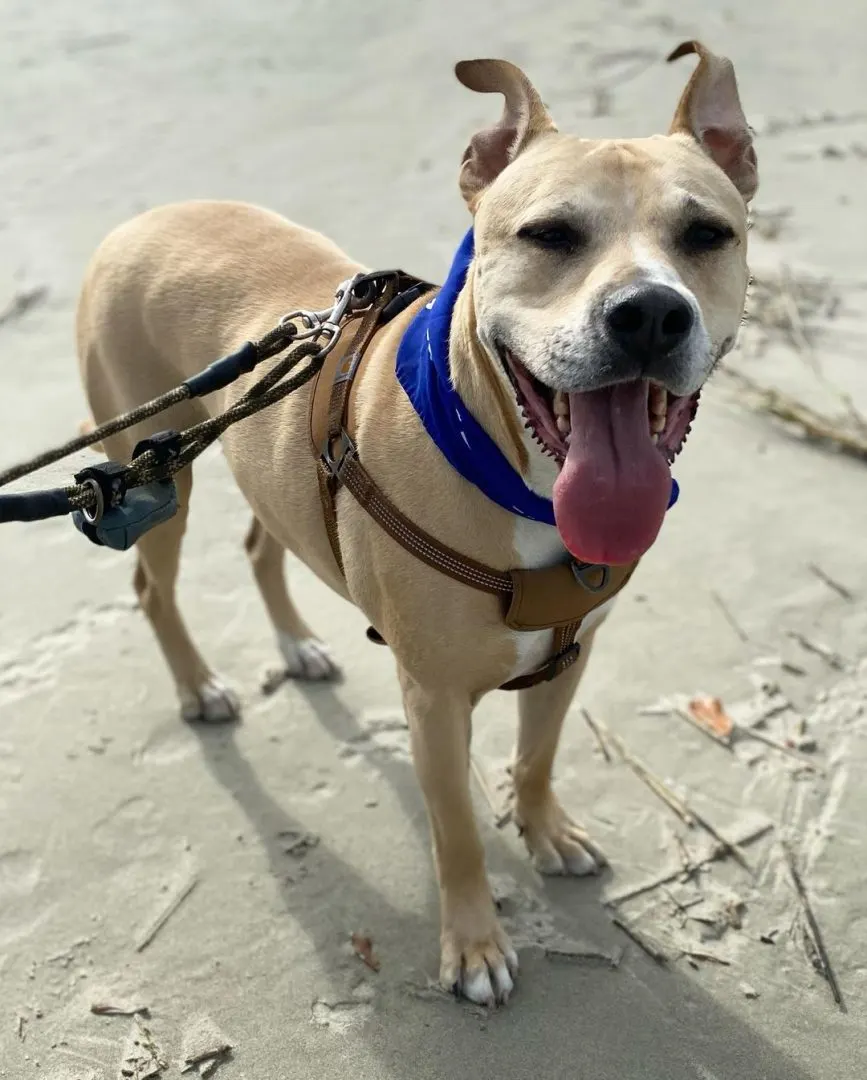
Dime lived the first three months of his life outside in a junkyard in Atlanta, Georgia, with a bunch of other dogs. One day, he and his doggo dad jumped the fence, and he ended up finding refuge at one giant-hearted woman’s home.
Only a few days later, Graham Fellers was contacted by his Atlanta friend about Dime. She wanted to know if anybody around him wanted to adopt Dime, and Graham immediately sprung into action!
He fell in love with this handsome boi right off the bat. And, within just days, Dime found the pawfect new home!
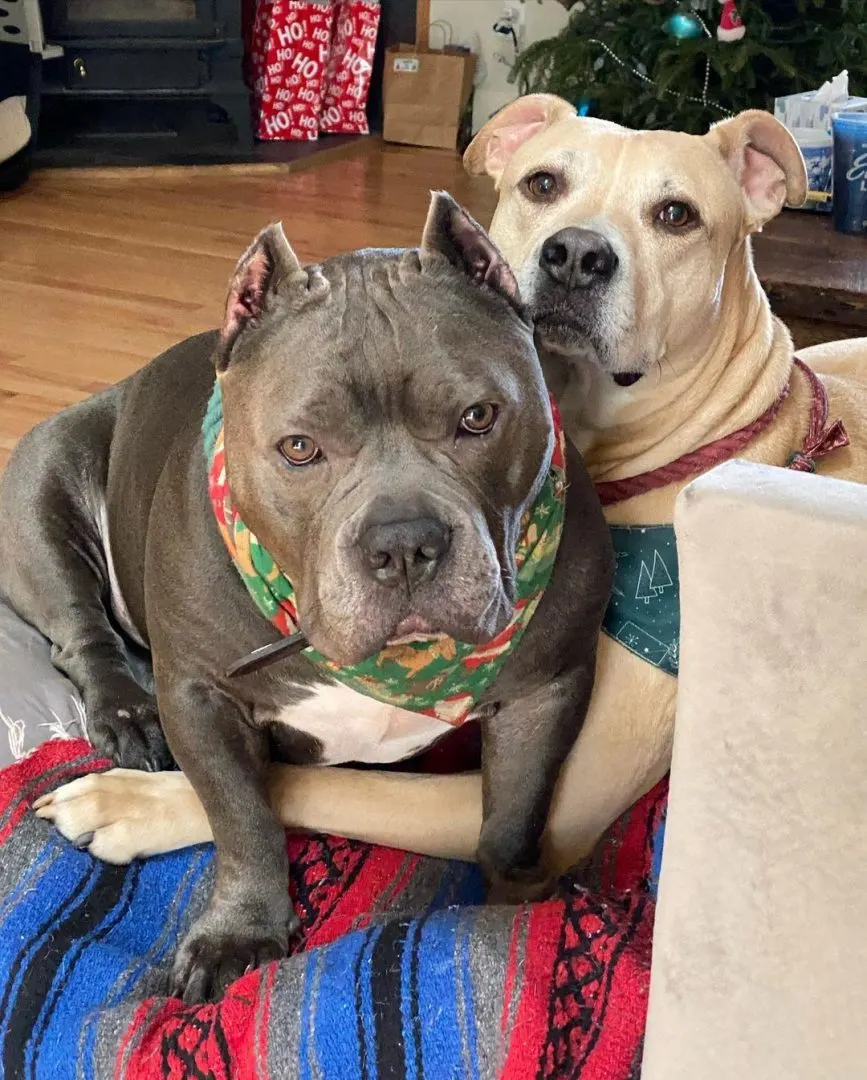
Graham and his wife, Skip, were so happy to welcome this dog into their loving home. The couple lived in the mountains and had plenty of space, which Dime loved.
He was shy during the first couple of months, but eventually, his gentle personality kicked in. Despite his fast growth and the fact that he turned into a giant, Dime was nothing but the kindest, sweetest lovebug!
In 2020, the couple adopted another dog, an American Bully who they named Pork Roll. Even though he was nothing like Dime, the two immediately formed a special bond.
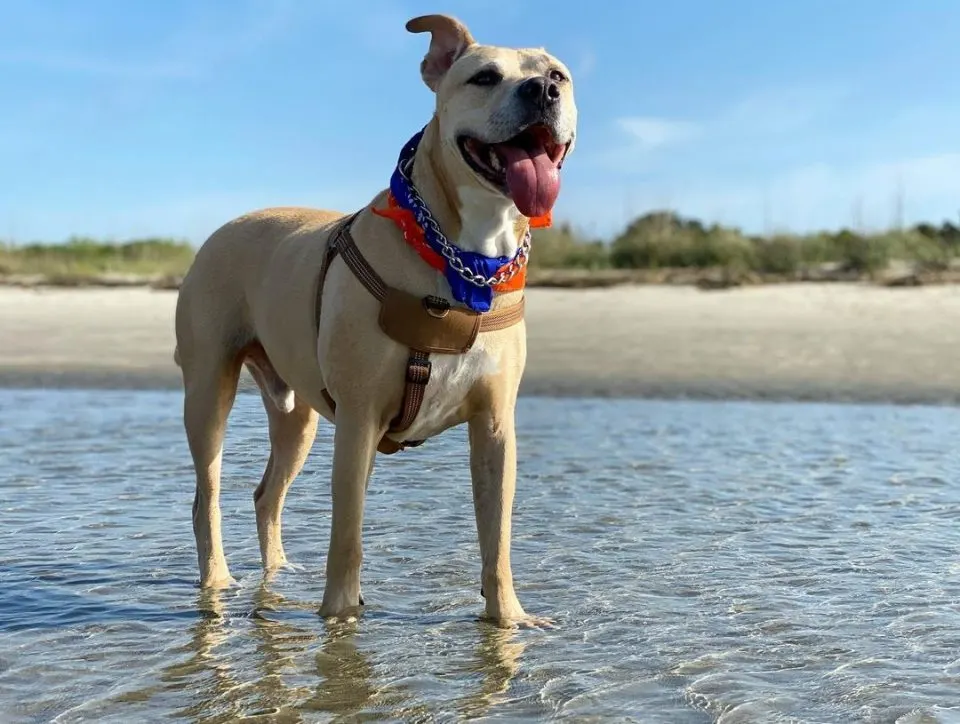
Unlike his older brother, Pork Roll was a goofy pup who had his way, making Skip and Graham entertained at all times!
“He either has the energy of a Tasmanian devil or he’s napping for 6 hours after his breakfast. He’s stubborn, playful, goofy, and ALWAYS will get his way,” Skip wrote on Instagram.
Pork Roll and Dime had a blast together! Despite their differences, the dogs were extremely bonded. They had wonderful play sessions outside, went on walks together, and even slept cuddled up next to each other.
Still, Dime’s favourite person in the world is his dad. He is very attached to him, and it is safe to say that the two have their little world together!
A Heartbreaking Surprise
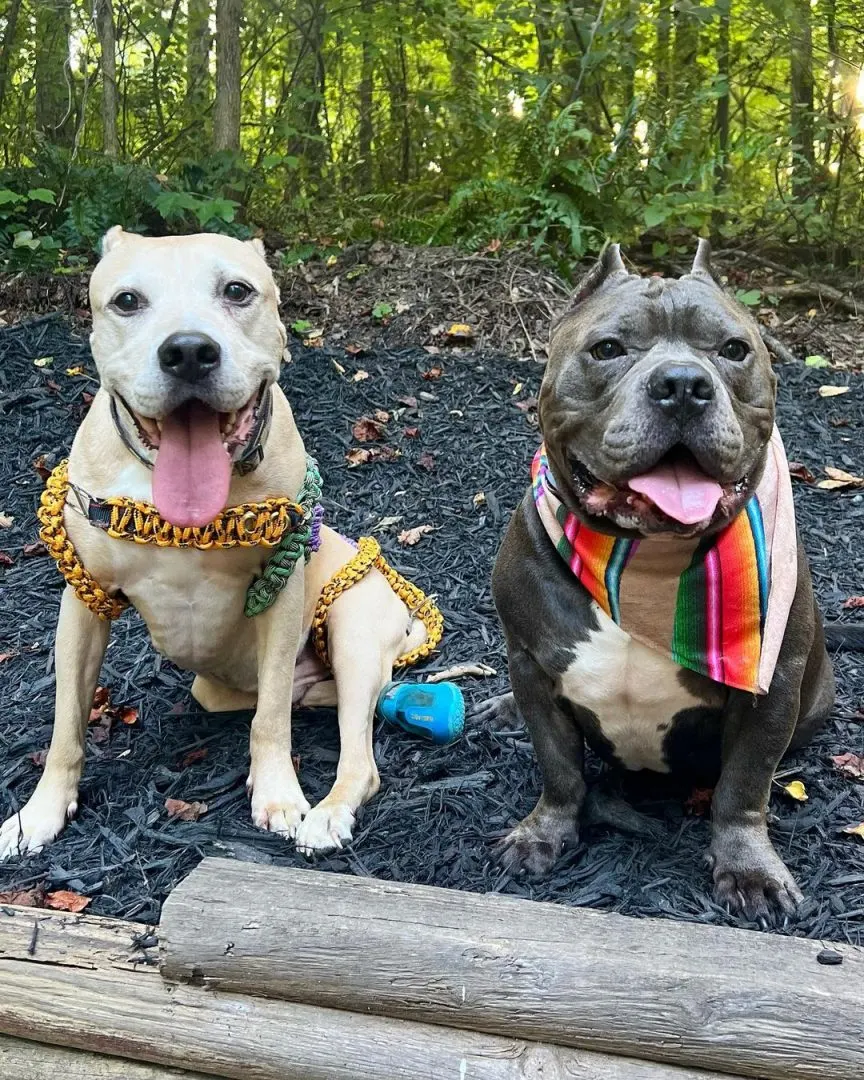
Years into his life with the Fellers family, Dime’s owners started noticing something strange. Dime was favoring one of his feet more than usual. He had trouble moving as easily as he used to, so the couple decided to subject him to a vet exam.
Sadly, after almost nine wonderful years, he was diagnosed with degenerative myelopathy, a progressive disease that affected Dime’s spinal cord. The disease affected his mobility, resulting in hindleg weakness and progressive numbness.
Graham and Skip did everything they could to make Dime’s life easier.
For the first few months, all he needed was a little support during his walks, so his dad came up with an idea. He made his boi a specially designed harness that supported his hind legs during the walks.
The couple also got Dime a wheelchair that helped him walk independently. Sometimes, his little brother, Porkie, tugs the wheelchair during the walks to help Dime walk more easily.
Despite his progressing condition, Dime never lost his sparkle. He accepted his life without a problem, and now, even though he lives by a certain set of new rules, he still seems so happy around his family.
“Dime has lived the most full life with us. He’s been to baseball games, national parks, backpacking trips, hundreds of restaurant patios, the Gulf of Mexico, the Atlantic Ocean, and countless hikes all over,” his momma wrote on Instagram.
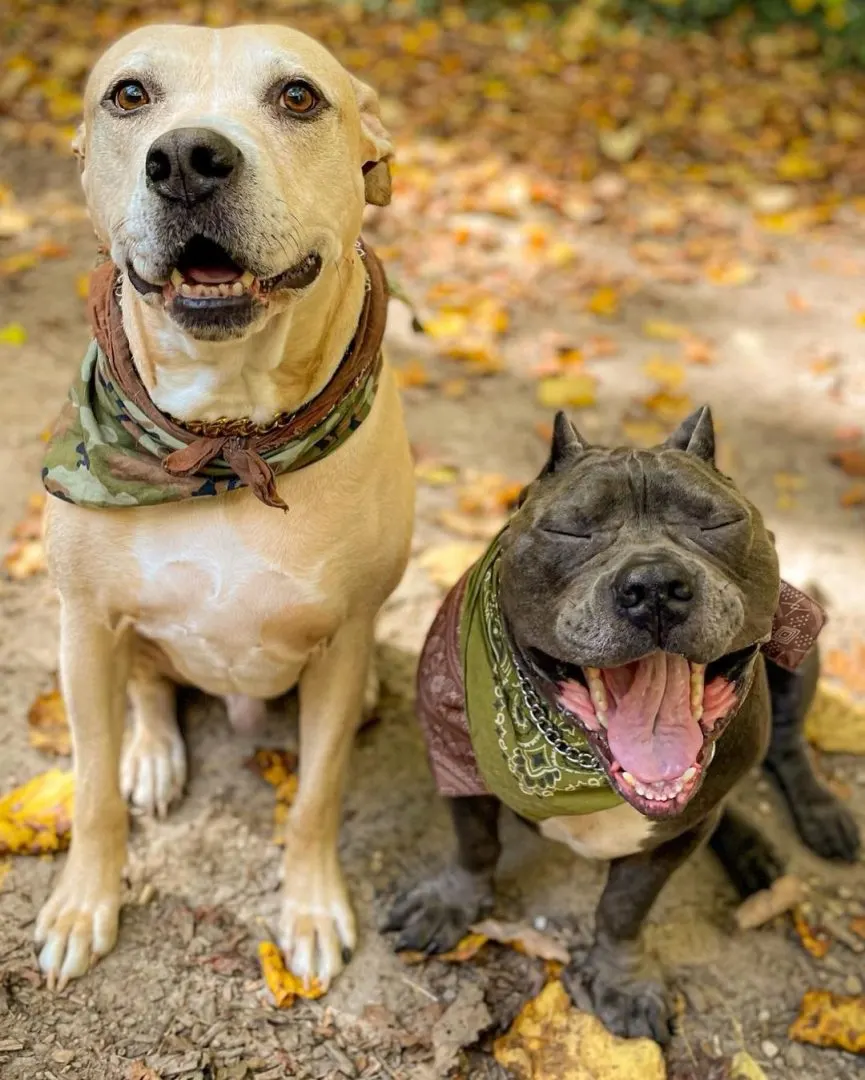
His family makes sure to make him feel included in everything. Together with Pork Roll, Dime enjoys every second in the mountains.
He still goes on walks with his dad, has long cuddle sessions on the couch, and has some of the best treats for being such a good boi!
Graham and Skip are grateful for having Dime around, and they know that his disease is nothing but a speed bump along the way!
If you’ve ever noticed your furry friend constantly licking his lips, you might be wondering what’s going on in that canine mind of his. Dogs have a unique way of communicating, and lip licking is just one of the many behaviors they exhibit. It’s like a secret code they use to convey their feelings and thoughts, often without uttering a single bark.
When your pup starts licking his lips, it could mean a variety of things – from feeling anxious or stressed to simply being hungry or anticipating a treat. Understanding why dogs engage in this behavior can give you valuable insights into their world and help you decipher their silent signals. So, next time you catch your dog licking his lips, remember, there’s more to it than just a wet snout.
Understanding the Canine Behavior: Licking Lips
Possible Causes for Lip Licking in Dogs
Sometimes, your dog may lick its lips as a way to cope with stress or anxiety. It’s like when you bite your nails when you’re nervous. Lip licking can be a sign that your furry friend is feeling a bit uneasy or worried about something.
When Is Lip Licking Considered Normal?
If your dog is simply giving its lips a quick lick after a meal or a tasty treat, there’s likely no cause for concern. Dogs can lick their lips to clean up food residue or even just out of habit, much like how humans might lick their lips. This kind of lip licking is generally considered normal behavior for dogs.
Medical Reasons Behind Excessive Lip Licking
Dental Issues and Oral Discomfort
If your dog is constantly licking its lips, it could be due to dental problems or oral discomfort. Dogs may lick their lips excessively if they have a toothache, gum disease, or any other oral issue causing pain. Check for signs like bad breath, inflamed gums, or reluctance to chew hard food, as these could indicate underlying dental issues. Regular dental check-ups and proper oral care can help prevent discomfort that leads to excessive lip licking.
Nausea and Upset Stomach
Another possible reason for your dog licking its lips excessively could be nausea or an upset stomach. Dogs may lick their lips more frequently when they are feeling nauseous or have an unsettled stomach. Keep an eye out for other symptoms like vomiting, lack of appetite, or abdominal discomfort, which could signal gastrointestinal issues. Providing a bland diet or consulting your veterinarian can help alleviate your dog’s nausea and reduce lip licking.
Allergies and Skin Conditions
Excessive lip licking in dogs might also be linked to allergies or skin conditions. Constant licking of the lips can be a way for dogs to relieve itching or irritation caused by allergies or skin problems. Look for other signs such as redness, rashes, or hair loss on the skin, which may indicate underlying allergies. Identifying the allergen or treating the skin condition with the guidance of a vet can help address the root cause of the lip licking behavior.
Behavioral and Environmental Triggers
Anxiety, Stress, and Nervousness
When your dog keeps licking its lips, it might be signaling feelings of anxiety, stress, or nervousness. Dogs can exhibit this behavior when they are in new or uncomfortable situations, feeling threatened, or are in pain. Pay attention to your dog’s body language and the surrounding environment to identify potential triggers causing these emotions. Providing a safe and secure environment can help alleviate your dog’s stress and reduce lip licking behaviors.
Seeking Attention or Indicating Hunger
Lip licking can also be a way for your dog to seek attention or indicate hunger. If your dog feels hungry or wants food, they may lick their lips as a way to communicate this need to you. Additionally, dogs may lick their lips to get your attention or as a learned behavior to receive treats or rewards. Ensuring your dog’s feeding schedule is consistent and meeting their nutritional needs can help address excessive lip licking due to hunger.
Lip Licking as a Submissive Gesture
In some cases, lip licking in dogs can be a submissive gesture to show deference to their owners, other animals, or unfamiliar individuals. Dogs may use lip licking as a way to avoid confrontation, display submissiveness, or promote harmonious interactions. Understanding your dog’s body language and communication signals can help you interpret whether lip licking is a submissive behavior in certain social contexts. Providing positive reinforcement and creating a supportive and loving environment can help reduce submissive lip licking behaviors.
Observing and Responding to Your Dog’s Lip Licking
When to Worry About Your Dog’s Lip Licking
If your dog’s lip licking becomes excessive and is accompanied by other concerning signs like bad breath, vomiting, or skin redness, it’s time to take action. These could be indicative of underlying medical issues such as dental problems, nausea, upset stomach, or allergies. Keep a close eye on these symptoms to determine if a veterinary consultation is necessary.
- Dental Check-ups: Ensure your dog gets regular dental check-ups to rule out toothaches or gum disease, which could be causing the excessive lip licking.
- Dietary Adjustments: Consider adjusting your dog’s diet to see if certain foods are triggering allergies or digestive issues leading to lip licking.
- Veterinary Consultation: If the lip licking persists, consult your vet to address any underlying health concerns that may be contributing to this behavior.
- Environment and Routine: Create a secure and stress-free environment for your dog to reduce anxiety-induced lip licking. Maintain a consistent feeding schedule to help alleviate any hunger-related lip licking.
- Positive Reinforcement: Use positive reinforcement techniques to redirect your dog’s behavior and discourage excessive lip licking. Engage in activities that keep your dog mentally stimulated and physically active to reduce stress-induced behaviors.
Professional Assessment and Treatment
The Importance of Veterinary Advice
When your dog exhibits chronic lip licking, seeking veterinary advice is essential. A vet can conduct a thorough examination to pinpoint the underlying cause of your dog’s behavior. With their expertise, they can rule out medical conditions such as dental issues, gastrointestinal problems, or allergies that may be triggering excessive lip licking. Veterinary advice is crucial in determining the most suitable treatment plan tailored to your dog’s specific needs.
Treatment Options for Dogs with Chronic Lip Licking
Treatment options for dogs with chronic lip licking may vary depending on the underlying cause identified by your veterinarian. Dental issues may require professional dental cleaning, extractions, or other dental procedures. Gastrointestinal problems might necessitate dietary changes or medications prescribed by the vet. Allergies and skin conditions could call for allergy testing, hypoallergenic diets, or medication to alleviate symptoms. Your vet will recommend the most appropriate treatment to address your dog’s condition effectively.
Conclusion
So, there you have it – your dog’s lip licking behavior can speak volumes about how they’re feeling. From emotions like anxiety, stress, and hunger to potential medical issues like dental problems or allergies, there’s a lot to consider. Remember to keep an eye out for any accompanying symptoms and consult your vet if you notice anything concerning. By being attentive to your furry friend’s lip licking habits, you can better understand their needs and provide the care and support they require. Stay proactive, stay observant, and most importantly, stay connected with your dog to ensure their well-being.
Frequently Asked Questions
What emotions can dogs convey through lip licking?
Dogs use lip licking to express emotions like anxiety, stress, hunger, or anticipation. It can also be a coping mechanism for stress.
When is occasional lip licking after a meal considered normal behavior in dogs?
Occasional lip licking after a meal is typically considered normal behavior in dogs.
What medical reasons can cause excessive lip licking in dogs?
Excessive lip licking in dogs can be caused by dental issues like toothaches or gum disease, nausea or upset stomach, and allergies or skin conditions.
How can pet owners identify if their dog’s lip licking is due to medical issues?
Pet owners can look for signs like bad breath, vomiting, or skin redness and should consult a veterinarian for regular dental check-ups and proper diagnosis.
What are the behavioral triggers for lip licking in dogs?
Behavioral triggers for lip licking in dogs include anxiety, stress, nervousness, seeking attention, indicating hunger, and submissive gestures to show deference.
What steps can pet owners take to address excessive lip licking behavior in dogs?
Pet owners can take actions such as maintaining a stress-free environment, consistent feeding schedule, positive reinforcement techniques, and seeking veterinary consultation for tailored treatment plans.
When should pet owners seek veterinary advice for chronic lip licking in dogs?
Pet owners should seek veterinary advice when their dog exhibits chronic lip licking, as vets can identify underlying causes and recommend specific treatment plans for dental issues, gastrointestinal problems, allergies, or other health concerns.

Hey there, I’m Janet Brooks, a dog-loving student from California. I’m all about helping pups in need, especially those without homes. Me and my awesome friends work together to give shelter and love to stray dogs. Oh, and I also write blogs about dogs to share helpful info.